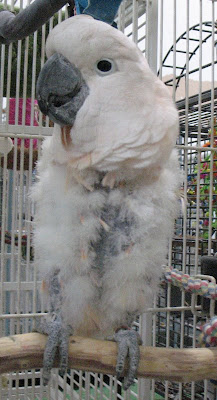Tango is a male severe macaw who is approximately 8 years old. He came to us from animal control after his previous owners were evicted, so we don't know much about his history.
Tango has been with us for several months now, and has wormed his way into the heart of most of the volunteers. He is one of the most entertaining birds we have ever had here. It's hard to be in a bad mood when Tango's around! He loves to sing and dance, even when there's no music around. He'll make the music!

He came to us with a beak that was so overgrown, due to malnutrition and lack of chewing opportunities, that we wondered how he was able to eat. Even now, he has what's called a scissor beak, where the top and bottom parts of his beak do not align properly. You can kind of see that in this picture, though it's very pronounced in person:

Tango currently needs frequent beak trims. We are hoping that now that he's on a good diet, and has tons of chew toys, beak trims may become a thing of the past. Maybe his beak will even align properly, though, if that does happen, it's likely to be years down the road.
Severe macaws do not make good pets for most people. They tend to be very
beaky birds (Tango is no exception) and that
beakiness can escalate to biting when they get too excited. They usually bond very strongly to one person in the house and actively work to show their displeasure to the
unchosen person. They are also very loud and scream frequently (once again, behavior we see in Tango).
Additionally, they go through a lot of wood, so keeping them in toys can become a major expense. A higher percentage of severe macaws come in with overgrown beaks than any other parrot surrendered to the Center, because their owners tire of spending so much money for toys and perches for such an ungrateful and irritating parrot (words we have heard from several different owners surrendering their severe macaws).
Despite the characteristics that make a challenge to live with in captivity, Tango is a delightful parrot. In the right home, where his owners will work on getting him enough physical and mental exercise, he will thrive.
 This little guy deserves to be loved and wanted. He will be up for adoption shortly, so stop by if you're interested in meeting him!
This little guy deserves to be loved and wanted. He will be up for adoption shortly, so stop by if you're interested in meeting him!











 These pictures were taken at the Center, in their travel cages, before we did intakes on them.
These pictures were taken at the Center, in their travel cages, before we did intakes on them.




















